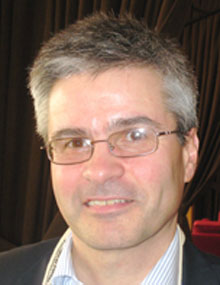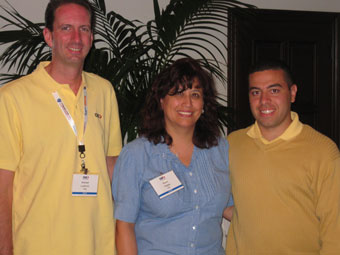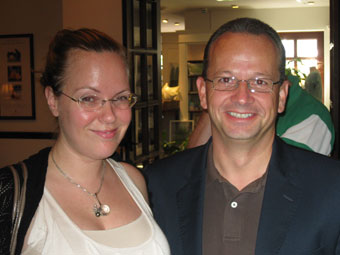
|
Vol. 8 No. 48 WE COVER THE WORLD Monday May 4, 2009 |
As CNS Partnership Conference gets underway in Carlsbad, California
this week we wonder how does the air cargo industry benefit from highly visible
and well attended IATA cargo themed conferences, including the Bangkok-held
IATA World Cargo Symposium this past March? We also would like to know what
are the next steps IATA will take toward enhancing speed, efficiency and quality
along the supply chain. Two of a number of questions IATA Cargo’s head
Aleks Popovich goes into deeper in this exclusive interview.
 Q:
Aleks, what are the big takeaways from your recently held Bangkok meeting
and what are the main actions arising?
Q:
Aleks, what are the big takeaways from your recently held Bangkok meeting
and what are the main actions arising?
A:
There are two main themes to highlight. First the tremendous positive
feedback received from delegates and second the importance of delivering on
the industry promises made at the concluding plenary of the Symposium.
Q: How many responses did
you receive from the Bangkok participants?
A:
From a total of 730 attendees 28 percent responded to our survey, the
highest response rate so far from all our previous meetings. Last year in Rome
the response rate was 25 percent and Mexico City in 2007 was 19 percent.
Q: Which issues got a high
rating, which topics were criticized?
A:
One of the key questions for us was how the delegates rated our WCS event
compared to any other cargo meetings. There, 75 percent voted WCS as either
best in class or much better than other industry air freight meetings. Only
1 percent is seeing Bangkok as a less important gathering. A very high rating
was received for the networking opportunities the WCS provide. Obviously there
is great demand for business meetings aside from the official agenda. We intend
to offer more networking facilities and tools during our upcoming Vancouver
symposium in 2010.
Q: Where else can IATA
Cargo enhance the annual meetings?
A: By offering more half
day tracks at complementary times where we minimize overlaps on topics of common
interest. It’s great to know we now have so much “talk to action”
content competing for the precious time of our delegates! This is a key lesson
we learned from Bangkok where many tracks ran parallel so the participants could
only attend a relatively small number of tracks. We want to put ourselves in
the shoes of different types of cargo professional participating in future events,
and make sure we tailor the event to meet their needs.
A:
For example, take the CEOs that have little time and might be interested
only in the Opening Plenary, the Cargo Economic Outlook, the Cargo Executive
Summit and the Cargo 2000 AGM before having to take on other obligations. Another
example is the Dangerous Goods professionals who are likely to be mainly interested
in a dedicated Dangerous Goods track. We intend to offer a full day for this
topic as an exception. It’s about designing the most effective journey
for each type of cargo professional participating in the Symposium. It’s
also about responding to demand for new content. For example, for the first
time in 2010 we intend to introduce a Customs track.
Q: The big shots of IATA’s
Cargo Committee have not been seen much at Bangkok. Any changes coming up there?
A:
Yes. Next time there will be much more visibility of the key decision
makers who are present, for example, members of the Cargo Committee who are
sponsoring the IATA Cargo agenda, as well as top forwarders who are championing
change in the air cargo supply chain. This is another lesson we learned from
the feedback I mentioned. I’m pleased to say the CNS Partnership Conference
already applies this lesson with our new CNS President Michael Vorwerk and members
of the CNS Customer Advisory Board playing active roles within the event.
The CNS Partnership Conference will pick up a
number of themes developed in the Bangkok IATA World Cargo Symposium and apply
them to the needs of the total cargo supply chain in the USA. For instance:
Focus on the customer, Battling the Crisis and Building the Future, e-freight,
Cargo 2000, Protecting the Cash, and the Environment. There, airline legend
Bob Crandall will give us his “outside looking in” views on lessons
of leadership in how to battle the crisis and build the future.
Q: Bangkok’s session
concluded with a number of promises made by IATA Cargo. How about their realization?
A:
We identified four main areas for taking action along the entire supply
chain: a) protect the cash, b) improve efficiency and speed of cargo flows,
c) deliver quality and product reliability, and d) keep shipments secure. Two
examples illustrate our efforts to put this to action.
First there is the CASS expansion with at least
ten additional CASS operations we intend to implement in 2009. Pakistan is one
major candidate we’ll put on the map, thanks to tremendous support from
the Pakistan Forwarder Association and the carrier community. Mexico and its
domestic market is another new CASS target, followed by CASS imports to Canada,
Australia and the Gulf area, just to name a few.
In addition to extending the reach of CASS we
take forwarder feedback very seriously. A current key issue is the time it takes
for an airline to respond to a billing error raised with them by the forwarder.
We are taking this issue very seriously and intend to solve this matter once
and for all. Therefore, by October we plan with the cooperation of the airline
community to not only propose working practices but also to implement them.
A second example where we take action is e-freight.
Five more locations and fourteen additional airports have been identified for
paper-free flows of goods during 2009. In addition we want to take action for
increasing the volumes of e-freight shipments. Finally,
we will meet small and medium sized forwarders at airports where e-freight already
exists to listen and respond to their views as to what are the remaining obstacles
to their participation in e-freight.
Q: Environmental questions
will be a major focus next year at your Vancouver Symposium. Do you really think
it is the right time to pushing this topic for an industry battling for survival?
A:
Yes. IATA remains committed to a global and effective approach on climate
change. The economic crisis has not shifted our vision in this regard. Indeed
no other industry has been as proactive as ours and we must keep it that way,
continuing to be ahead of the curve in influencing Environmental policies.
That’s why environmental issues will be placed prominently on Vancouver’s
agenda. Indeed 2009 will be a critical year for determining the post Kyoto protocol
framework. Decisions taken by the UNFCCC at Copenhagen in December this year
will include economic measures, which will impact aviation. We can’t wait
and see. We need to be prepared to influence.
Q: Despite improvements
due to Cargo 2000 and e-freight there is still a lack of effectiveness and decisiveness.
Should IATA airlines therefore lose their membership if they don’t fulfill
certain basic quality standards?
A:
I believe a more effective strategy here is to promote and recommend
improvements by positively motivating supply chain members to become Quality
Cargo Operators – i.e. you operate to e-freight, Cargo 2000, and Secure
Freight standards within a quality organizational culture. ‘If you want
to be successful in the business and be part of a supply chain selected by the
customer, you need to be a quality cargo operator’, that’s the message.
Q: The crisis is still
with us. Any recommendations from IATA’s head of cargo?
A:
The circumstances certainly remain with harsh volume drops in the last
three months showing demand at -22% to -23% below the previous year. We need
to see if the industry has bottomed out on this unprecedented fall off in demand.
Although the global situation looks gloomy, it’s clear based on previous
crises (e.g. 9/11), that now is actually the best time for forwarders and carriers
to accelerate industry transformation.
Heiner Siegmund
In The Picture At CNS This Week |
 As CNS Partnership 2009 Implementing The Vision opened at LaCosta Resort and Spa Carlsbad California setting the scene and tone of welcome at this most important event are Michael Ludovici, Rocio Vegas and Carlos Molina. Mr. Ludovici joined CNS in February 2008 as Vice President and Head of Operations. “People are excited and looking forward to the program,” Michael said. |
 Taking up the forwarders side of things Jenni Frigger Thomas Huchler of EMO Trans VP USA Southeast and Southwest. Mr. Huchler is featured in a Tuesday session with “Forward Thinking Strategies,” for small and medium forwarders. “We are about delivering a competitive edge in a volatile marketplace,” Thomas declared. |
|
New CNS President Details Agenda |
Feliz Cinco de Mayo!
|
|
Publisher-Geoffrey Arend • Managing Editor-Flossie
Arend • Advertising Sales-Judy Miller
Send comments and news to geoffrey@aircargonews.com
Air Cargo News FlyingTypers reserves the right to edit all submissions for
length and content.
All Cargo Media, Publishers of Air Cargo News Digital and FlyingTypers
Copyright ©2009 ACM, Inc. All Rights Reserved. More@
www.aircargonews.com